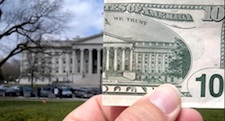This story didn’t make front page headlines in the financial media but behind the scenes, a battle took place with Capital One emerging as the winner.
Capital One, well known for their “what’s in your wallet” commercials agreed to purchase ING Direct USA for $9 billion paving the way for Capital One to become the 5th largest bank in the United States based on total deposits.
This acquisition faced tougher than expected scrutiny by Federal Regulators although they recently approved the deal.
By banking standards, this was not a large deal so why did it face such tough headwinds?
Capital One
Their advertising campaigns may be witty and clever but don’t mistake that for a company that isn’t a big player in the banking market.
Capital One has found a niche in the subprime credit card market.
With more than one third of their credit card portfolio subprime customers, some have seen this company as a small player who has contributed to the nation’s credit crisis by lending to customers who shouldn’t have qualified for a credit card.
Although they weren’t one of the top 10 largest banks, a string of acquisitions has changed that as Capitol One has not only purchased ING Direct USA, but also three other mid sized companies over the past few years raising the eyebrows of regulators and other interest groups that believe its $320 billion size puts it in the “too big to fail” category along with the nation’s four largest banks.
Bear in mind that Capital One is also waiting on approval to acquire HSBC’s American credit card business to add to their growing company.
Is that True? Would they be “too big to fail?”

The Federal Reserve didn’t agree.
After an extensive review along with a longer than usual public comment period, they concluded that Capital One operates differently than its four larger competitors.
First, the Fed concluded that the bank would be easy to unwind and sell off if they found themselves in the same type of situation as firms that were purchased in 2008 and 2009.
Next, Capital One and ING DIRECT don’t participate in the investment banking activities that the larger banks have been criticized for in the past. This, according to regulators, makes Capital One less vulnerable to downturns in the investment markets.
As Capital One said in their defense of the deal, they deal in mom and pop banking activities instead of complicated derivatives and other activities.
Finally, even as the 5th largest bank, they are still significantly smaller than the top four banks. Capital One may have more than $300 billion in deposits but the larger banks have trillions in assets.
Consumer Friendly(?)
As part of the approved deal, Capital One has agreed to make a larger commitment to more community based banking activities including a 10-year, $180 billion commitment to investment and lending in local small businesses and other community based practices. They also unveiled a plan to add 500 jobs in Delaware, ING Direct USA’s headquarters.
In a press release, they said that by adding ING’s portfolio of products they could expand their product offerings to reach a larger number of people.
Bottom Line
The Federal Reserve issued a 40 page ruling explaining the methodology behind their ruling as well as their commitment to scrutinize all bank mergers in order to protect against creating “too big to fail” institutions and that Capital One is a not a systemic risk to the nation’s economy.
What do you think? Is it wise for the Fed to let Capital One acquire ING Direct USA?
sources:
http://online.wsj.com/article/SB10001424052970204883304577223642288976730.html
http://dealbook.nytimes.com/2012/02/14/fed-approves-capital-ones-deal-for-ing-direct/
other takes on the acquisition:
Federal Reserve Approves Capital One’s Acquisition of ING Direct
Update 2: Fed Approves Capital One Acquisition of ING Direct – MyBankTracker.com
I’m not sure if taking 5th place really makes them too big to fail…
Even at 5th place they are still a lot smaller than the four above them.
I think people get worried these days when they see big banks merge. We don’t want to see mergers that end up getting bailed out. I have no problem the the Fed putting in some due diligence before an approval.
One of the most hated banking companies acquires my favorite banking company……I just hope they don’t ruin ING Direct. I’ll be a sad rock who will change banks.
IT would be a shame if they were bought just for the assets and not for the culture ING cultivated.
I agree. I use ING for all of my banking and have been watching closely for any changes to my accounts. I hope ING stays the same as I love it, but I won’t hesitate to jump ship if Capital One makes drastic changes.
This makes me a little sad. I am with ING – it’s ING Canada so doesn’t apply here – but I think it’s such a great bank, one of the banks that doesn’t suck (and probably the only one that doesn’t charge fees). It has the best customer service and it’s so personable. I love their investment options and just love them as a bank. I can totally see ING being ruined by Capital One.. I’m glad ING Canada hasn’t been bought out yet, but I’m sure one day it will happen.
Well, the ING USA sale had to do with European bailouts so you may not have to worry about the Canadian version.
I hope Cap One uses this as a way to improve their brand by following the example ING Direct has set up all these years. Time will tell.